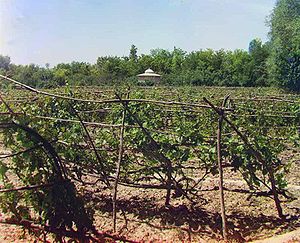Proper 22A Text: Matthew 21:33-46
Like last week, the lectionary has us dealing with some pretty tough stuff. It should come as no surprise since this all takes place during Jesus’s final week. Jesus has entered Jerusalem in a mock triumphal entry with his merry band of misfits and enormous crowd of followers. The group heads up to the Temple where Jesus berates and belittles the Jewish leadership in front of the crowd. Then he continues:
33 ‘Listen to another parable. There was a landowner who planted a vineyard, put a fence around it, dug a wine press in it, and built a watch-tower. Then he leased it to tenants and went to another country.34When the harvest time had come, he sent his slaves to the tenants to collect his produce. 35But the tenants seized his slaves and beat one, killed another, and stoned another. 36Again he sent other slaves, more than the first; and they treated them in the same way. 37Finally he sent his son to them, saying, “They will respect my son.” 38But when the tenants saw the son, they said to themselves, “This is the heir; come, let us kill him and get his inheritance.” 39So they seized him, threw him out of the vineyard, and killed him. 40Now when the owner of the vineyard comes, what will he do to those tenants?’
This parable is often known as the Parable of the Wicked Tenants. We can easily see why. They’re horrible. They treat people as garbage. So Jesus gives the crowd the chance to explain what the master would do:
41They said to him, ‘He will put those wretches to a miserable death, and lease the vineyard to other tenants who will give him the produce at the harvest time.’
The crowd deduces that the wickedness of the tenants deserves a harsh, retaliatory response. But Jesus seems to have something different in mind…
42 Jesus said to them, ‘Have you never read in the scriptures:
“The stone that the builders rejected
has become the cornerstone;
this was the Lord’s doing,
and it is amazing in our eyes”?
43Therefore I tell you, the kingdom of God will be taken away from you and given to a people that produces the fruits of the kingdom. 44The one who falls on this stone will be broken to pieces; and it will crush anyone on whom it falls.’
Here it gets confusing. He suggests that the crowd is wrong for saying that the owner should be harsh with the tenants, quoting scripture about the stone rejected by the builders. However, he concludes that the Kingdom “will be taken away from you”. With the parable’s harsh judgment and this claim to a retaliatory reclaiming, it sounds as if Jesus is talking about vengeance. But something else was heard here:
45 When the chief priests and the Pharisees heard his parables, they realized that he was speaking about them. 46They wanted to arrest him, but they feared the crowds, because they regarded him as a prophet.
The leaders heard this as a rebuke of them, not the people and that Jesus was not condemning humanity for the rejection of Jesus, but the leadership.
Now jump back to verse 38 and reread what the tenants say about the owner’s son:
“This is the heir; come, let us kill him and get his inheritance.”
We can believe that this is Jesus talking about himself and the salvation of the world, I suppose. But this is key to me: the tenants kill the son, not because they are murderers, but because they want to possess his inheritance. The reason the chief priests and Pharisees thought this was about them was because Jesus was condemning the leadership for trying to take over creation, stealing it from GOD. They believed they were in charge.
It is my bias, but as a leader in the church, and as one who has spent his entire life in the church, I don’t read myself into the ignorant masses who couldn’t read or write or know the story of creation and liberation. I can’t see myself in the crowd. I, and most people in church on a Sunday morning are the Pharisees. And Jesus condemns them for knowing better: for knowing about GOD’s ownership of creation and still wanting to possess it. Like last week, his outrage comes through, not because he thinks they’ve screwed up; that can be forgiven. The problem is that they know they are on the wrong track, or should since they have all the ability to. The fact that they don’t know is proof that they are ignoring GOD’s will. And that is a problem.
Question:
If we know that GOD is in charge of creation, and all that we care about, how do we live like our environment isn’t ours? How do we live like we are responsible for the world and all that is in it as just and merciful tenants?


Leave a Reply